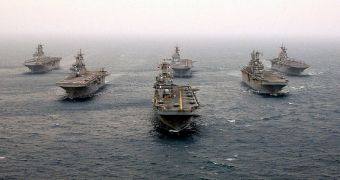The US Navy spares no efforts to display an eco-conscious attitude. It has previously announced its commitment to algae-based biofuels and now it is also eager to experience a green boost provided by inedible animal byproducts, like chicken fat and beef tallow.
This strategy comes as an effective response to president Obama's call, compelling the biofuel sector to cut off the usage of products that are currently used in the food industry, like corn, for example, CleanTechnica reports.
As a result, the algae-based premium fuel witnessed a rapid development and the same path was followed by eco fuel made of animal parts unsuitable for eating.
The U.S. Navy could send ships powered by a smart mix obtained mostly out of animal fat and used cooking oil, as a result of an agreement signed with suppliers.
The contract is worth $12 million (€8.9 million) and stipulates the US Navy could stay green while using 450,000 gallons of biofuel. This impressive amount is partially made of nonfood grade animal products provided by Tyson Foods, Inc.
One of the biofuel providers is Solazyme, also mentioned in the contract, that is going to deliver earth-friendly algae-derived fuel.
This initiative is part of a more ambitious plan, since the US Navy intends to launch Green Strike Force, relying on ships and aircrafts powered entirely by alternative fuels with a low environmental footprint.
The eco-friendly fleet will be used throughout an important marine exercise that will take place next summer, the Rim of the Pacific (RIMPAC).
Even so, the new fleet is not going to be entirely green, since the innovative biofuels will be mixed with traditional fuels.
The US Navy has high expectation, taking into consideration that previous tests revealed half-and-half blend is as efficient as pure petroleum, but represents a much more conscious option.
Using chicken and beef to power an entire fleet appears to be an amazing idea, definitely in favor of the environment. Instead of just throwing out the inedible animal byproducts, they could be exploited as an unlimited resource with a lot of potential.

 14 DAY TRIAL //
14 DAY TRIAL //